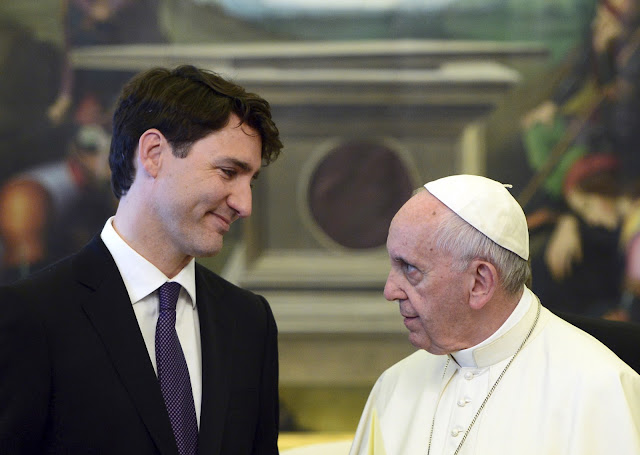A Few Telling Tidbits
 |
| Pope Trudeau | AP |
The Generational Divide in the Priesthood by Darrick Taylor
That younger priests are drawn to the older rite and to traditional spirituality I have long known, but seeing this priest made visible for me the generational divide within the priesthood today. It is one of those topics that can be delicate to speak of but is almost impossible to ignore: younger priests care more about orthodoxy, liturgy, and tradition than those ordained in previous decades. Many could produce anecdotes like the one above, but a recent survey of priests in the United States confirms this.
- https://www.crisismagazine.com/2022/the-generational-divide-in-the-priesthood
- https://papers.ssrn.com/sol3/papers.cfm?abstract_id=3951931
The Politicization of Ad Orientem by Eric Sammons
When I first arrived at the Diocese of Venice, my family were happy Novus Ordo-attending Catholics. We explored the parishes around us, but what we found were variations on the same theme: the priest was a performer, celebrating the Mass to please the congregation and to boost his ego. This is the reason we first started attending the traditional Latin Mass—we couldn’t find a reverent Novus Ordo within driving distance and didn’t want our kids exposed to such dismally-celebrated liturgies. We needed an escape from the insanity.
Timelapse video of '22 March For Life
- https://twitter.com/StudentsforLife/status/1484660281913475072
- https://www.youtube.com/watch?v=cMKP2oqQRP0
Watch the FULL timelapse of the '22 #MarchforLife! We estimate 150,000 people.
The Rise of Wildean Wokeism by Alexander Riley
I was the only faculty defender of Wax on my campus, and apparently the only one who had read her work. In short order I was denounced as a “white supremacist” for having the audacity to ask my colleagues to present evidence of their charges. One particularly shrill member of the Wilding mob accused me of threatening my colleagues, because I had written that it is impossible to take people seriously when they are throwing around unscholarly charges of racism and other crimes.
The entire episode was a revelation to me. I had known, of course, that wokeism existed in my place of employment, but I did not know previously how much it had infected my colleagues. It shook my confidence that reason and the traditional academic ethic of civil debate would prevail. I am now quite uncertain about how things will go, here at Bucknell and in higher ed generally.
Lionel Johnson: The greatest English poet and critic you’ve never read, by Robert Asch
CWR: Johnson had an interest in Buddhism and other esoteric belief systems, but ended up converting to the Catholic Faith. How did that come about? And how did it affect his thought and writing?
Robert Asch: Johnson began as an unconvinced Anglican, unhappy with the moralistic, shallow religious practice which had become hardly more than a social reflex for many. He had and retained a deep love of Jesus Christ, but wanted to see what alternative belief systems had to say for themselves, how well Christianity stood up to them in unprejudiced comparison – one early result of which was his growing admiration for Roman Catholicism, which emerged from such comparisons far more robustly and credibly than different shades of Protestantism. He was also deeply impressed with a sense of the mystery and spirituality of Eastern religions, as well as their metaphysical dimension.
However, he had nagging reservations about Eastern religions which became more pronounced during his spiritual quest. Compassion for his fellow man was a deep and abiding element of Johnson’s character. Where he found Eastern religions wanting (and esoteric belief systems, for that matter) was in their quasi-inhuman spiritual, ascetic, and intellectual demands, and an aloofness from the needs and lives of ordinary men and women. Johnson had a very deep attachment to Western civilisation, its works and values. The authors most important to him were Plato, Aeschylus, Virgil, St. Augustine, Pascal, Dr. Johnson, Newman…the great Christian sages and their closest Graeco-Roman precursors. But all of this was not enough to convert him on its own.
Johnson experienced a kind of epiphany towards the end of his undergraduate years, or possibly in his first year as a man of letters in London, when all the different strands of his interests came together, and they did so in the Roman Catholic Church with its tradition linking all of them into a coherent, overwhelmingly profound and beautiful, convincing whole, rather than the disconnected fragments evoked in, say, Eliot’s Wasteland. He found the Catholic Church logically, historically, and doctrinally coherent, and yet it spoke intimately to the deepest needs of men and women. Unlike various flavours of Anglicanism, it was not a theory but a great historical and existential reality.






Comments
Post a Comment
Your comments will be appreciated and posted if 1) they are on topic and 2) preserve decorum.
Stand by your word.